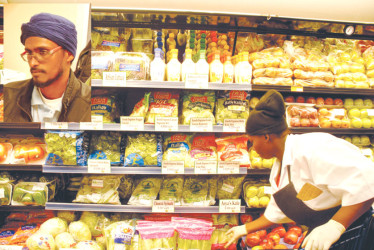On Saturday, people travelled from as far away as Linden to be part of the experience shopping—in some instances simply browsing—inside the new Massy Stores Supermarket on its first trading Saturday.
The supermarket’s General Manager Jaipersad Gayapersad, the only non-Guyanese on a staff of 120, describes the advent of what is almost certainly the country’s largest supermarket as a “first world” shopping experience. As it turns out it is much more.
By accident rather than design more than ninety per cent of the staff is below the age of 25. With the General Manger, it seems, first impressions count. He is impressed with their “energy and drive…” a cut above the attitude in his native Trinidad and Tobago, he says.
Earlier this year, as preparations for opening got underway, 25 of the staff in management positions were sent to Port-of-Spain to gain practical experience and to learn the culture of the chain. At the weekend they appeared enthusiastic and energized. It is the consistency or otherwise of their effort that will determine how consumers judge the new supermarket.
On Saturday, many of the people who had made the journey to the country’s newest supermarket were shopping as though they had been patronizing the facility for years. The line of reasoning that led to the decision by the Massy enterprise to expand their entrepreneurial pursuits in Guyana has to do—in large measure—with the springing up of new communities along the East Bank corridor. Major housing development is customarily followed by other services and facilities and the advent of Massy’s first supermarket in Guyana is a manifestation of that reality.

The range of goods offered by the new supermarket is itself a reflection of the value that it adds to a number of other businesses, particularly those located close by. Massy Supermarket offers a range of locally produced items: meats, fresh fruit and vegetables, spices and condiments, bakery products, beverages, wines and spirits.
The General Manager explains that patronage of local businesses is high on the list of priorities of the new supermarket and that apart from the widely-known brands of products opportunities have also been provided for small operators across the sectors who are seeking to grow their markets. These include farmers, agro processors, bakers, butchers and manufacturers of all sorts of condiments. The store has cast its net far and wide and suppliers’ contract agreements have already been signed with middlemen who will engage the farmers. There will be other opportunities for local producers to cash in on the new Massy investment. The store’s Manager told Stabroek Business that its search for producers of grated cassava and coconut had taken it to a number of small businesses and that eventually it had struck a deal with a local farmer who has decided to invest in the equipment to manufacture and supply the products. The whole idea, he says, is to offer local enterprises opportunities to grow.
That opportunity, however, comes with challenges, not least of which is the pressure on suppliers to reach what the supermarket’s General Manager says are the high safety and health standards which the facility has set itself. To this end, the supermarket’s standards officials will be paying periodic visits to local production facilities. Issues of packaging and labelling will now become even more important if locally produced goods are to hold their own on the supermarket’s shelves alongside their imported counterparts.
With the advent of the new Massy
Supermarket there is also an enhanced opportunity for local importers. The Manager told Stabroek Business that rather than undertake its own importation, the supermarket intends to work with local importers to secure supplies for its shelves.
As has become commonplace with modern supermarkets the world over, the new Providence facility offers a range of ancillary services. Perhaps not surprisingly, Republic Bank has become the first commercial bank to set up an ATM service. There is also a pharmacy that dispenses prescriptions.
Banking on customers making the drive from various locations along the East Bank, communities west of the Demerara and even Georgetown and the East Coast, the supermarket has provided a car park that can accommodate around 200 vehicles. No doubt, too, as has become customary with major business houses these days, a taxi service will probably attach itself to the supermarket sooner rather than later.
By late morning on Saturday, the supermarket had attracted scores of shoppers though there was no sense of it being crammed. The aisles are wide and it would probably take a few hundred people to fill the 16,000 square feet of trading space.




